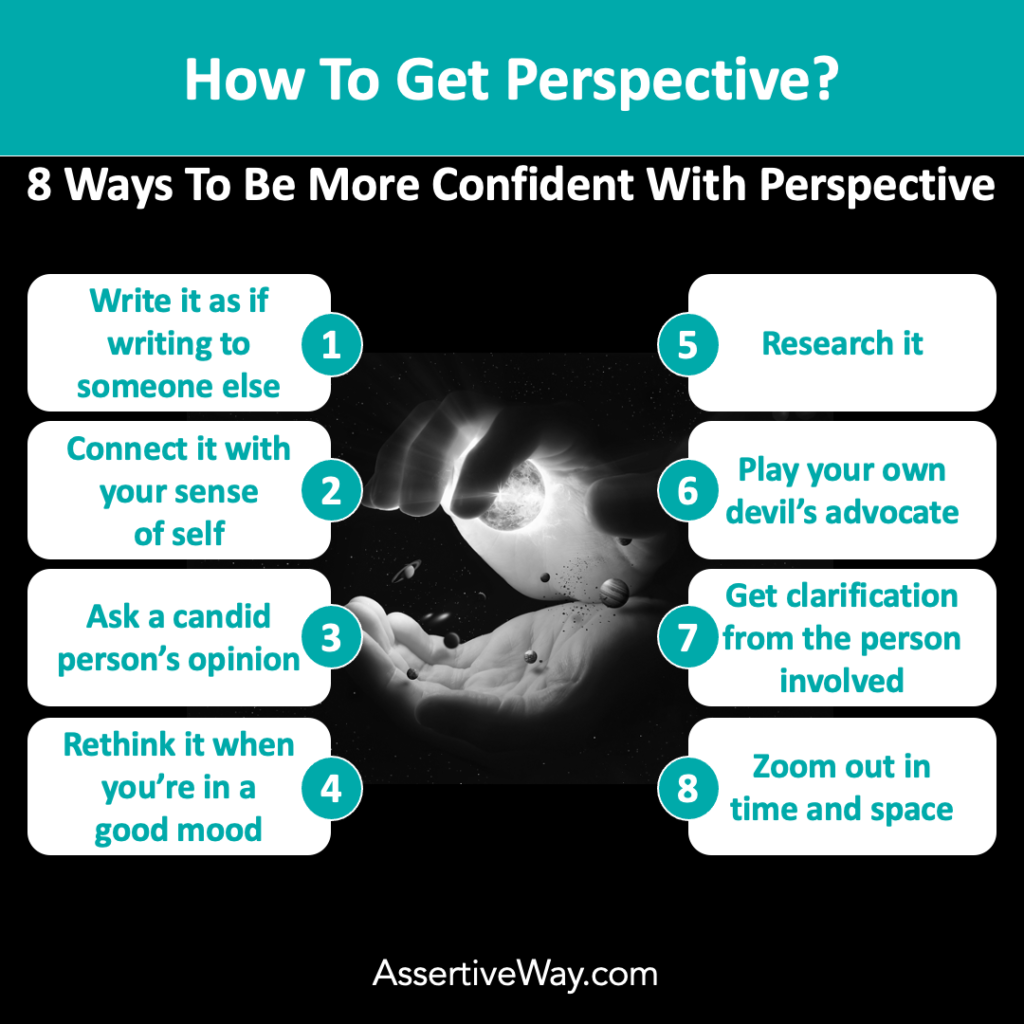Overcome self-about and overthinking with these hacks.
By Assertive Way
Key Takeaways
- Much of your confidence comes from the way you think about things.
- Overthinking is a sign you need a fresh outside perspective.
- Confident vs. not confident: same facts, same people, simply different interpretations.
- Try one of these 8 strategies in the article below to shift your perspective when you don’t feel confident.
- Increase your confidence by learning the 10 habits of confident communicators by clicking here.
Sign up for our Weekly Newsletter “Nice With Limits” for tips and inspiration for confidence at work and to boost your career!
We take your email seriously and will never sell or share it.
To feel more confident, often all you need is an outside perspective to get out of your negative overthinking.
Here are 8 ways to change your perspective on a negative interaction.
1. Write it as if writing to someone else.
In my early 20s, I wrote detailed emails about my weekly frustrations to my mother. I explained what I observed, how I interpreted the situation, how it made me feel, and how I chose do deal with it. By writing for her to understand the situation, I was able to better think through my issues, articulate it, and gain a fresh perspective, even if I didn’t ever send the email.
I also wrote long emails to people I was really frustrated with without sending it to them. This helped me balance my emotions and give me perspective.
2. Connect it with your sense of self.
If you allow a bad interaction or negative outcome define who you are, then you’re probably not clear on who you are. Take the time to think about what makes you unique. What are your values. What is the foundation for success for you? What do you like and dislike? What are your strengths and weaknesses? Appreciate who you are, and personal faults will become smaller or less important.
3. Share it with someone who is candid.
Get an external point of view from a thoughtful family member, mentor, colleague, friend, or even your boss. Choose someone who you trust and who has the courage to give you candid feedback rather than just to support your current point of view.
They can ask you questions that will lead you to a new way of thinking about the issue or point out your strengths and accomplishments when all you can see are flaws. They can rephrase the issue in simple words.
4. Research it.
When you increase your knowledge about a topic, you gain greater perspective on it. You expand the range of possibilities. Research your topic in books, articles, or podcasts. Then compare it against your own situation. This works well with journaling.
5. Play your own devil’s advocate.
Look for your own opposing view on the issue. If you think you were a disaster, find reasons you did well. If you think others dislike you, find reasons why they should like you.
6. Ask for clarification from the person involved.
If you overthink an interaction or conversation with someone and find yourself assuming what their words or actions meant, then the best way to resolve it is by asking for clarification directly with that person. Ask them to clarify their intention, interpretation, and expectations.
7. Rethink it when you are in a good mood.
When you are in a good mood, you’ll likely have a more positive and optimistic perspective. If you’re moody you’ll have a negative and pessimistic perspective. Schedule time to think about the issue after exercising, a walk outside, or during the weekend, when you are feeling more connected and confident.
8. Zoom out in time and space.
The stoics leader and Roman emperor Marcus Aurelios used perspective-taking often. He looked at the bigger picture by zooming out in space. What is your situation compared to others in your neighborhood, planet earth, and the great universe?
Alternatively, fast forward in time and look at what this episode will look like from then. For example, if you’ve been fired, your future may see it as an opportunity to move you into a better career.
What has been hurting your confidence lately and how can you shift perspective on it? Which perspective shifting technique do you like the best?
If you allow a bad interaction or negative outcome define who you are, then you’re probably not clear on who you are.
Sign up for our Weekly Newsletter “Nice With Limits” for tips and inspiration for confidence at work and to boost your career!
We take your email seriously and will never sell or share it.

Summary
Here are 8 ways to change your perspective on a negative interaction.
- Write it as if writing to someone else.
- Connect it with your sense of self.
- Share it with someone who is candid.
- Research it.
- Play your own devil’s advocate.
- Ask for clarification from the person involved.
- Rethink it when you are in a good mood.
- Zoom out in time and space.
“No problem can be solved from the same level of consciousness that created it.” – Albert Einstein
